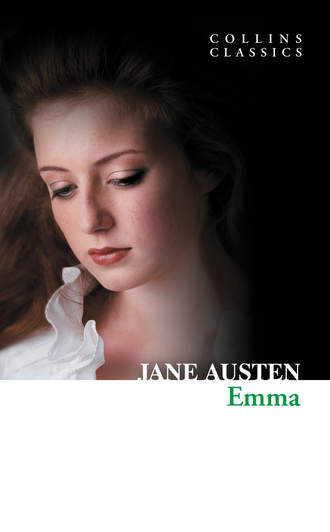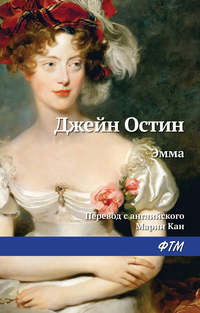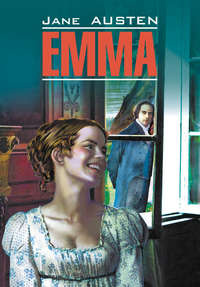
Полная версия
Emma
‘I believe it is very true, my dear, indeed,’ said Mr Woodhouse with a sigh. ‘I am afraid I am sometimes very fanciful and troublesome.’
‘My dearest papa! You do not think I could mean you, or suppose Mr Knightley to mean you. What a horrible idea! Oh, no! I meant only myself. Mr Knightley loves to find fault with me you know – in a joke – it is all a joke. We always say what we like to one another.’
Mr Knightley, in fact, was one of the few people who could see faults in Emma Woodhouse, and the only one who ever told her of them: and though this was not particularly agreeable to Emma herself, she knew it would be so much less so to her father, that she would not have him really suspect such a circumstance as her not being thought perfect by every body.
‘Emma knows I never flatter her,’ said Mr Knightley, ‘but I meant no reflection on any body. Miss Taylor has been used to have two persons to please; she will now have but one. The chances are that she must be a gainer.’
‘Well,’ said Emma, willing to let it pass – ‘you want to hear about the wedding; and I shall be happy to tell you, for we all behaved charmingly. Every body was punctual, every body in their best looks. Not a tear, and hardly a long face to be seen. Oh! no, we all felt that we were going to be only half a mile apart, and were sure of meeting every day.’
‘Dear Emma bears every thing so well,’ said her father. ‘But, Mr Knightley, she is really very sorry to lose poor Miss Taylor, and I am sure she will miss her more than she thinks for.’
Emma turned away her head, divided between tears and smiles.
‘It is impossible that Emma should not miss such a companion,’ said Mr Knightley. ‘We should not like her so well as we do, sir, if we could suppose it. But she knows how much the marriage is to Miss Taylor’s advantage; she knows how very acceptable it must be at Miss Taylor’s time of life to be settled in a home of her own, and how important to her to be secure of a comfortable provision, and therefore cannot allow herself to feel so much pain as pleasure. Every friend of Miss Taylor must be glad to have her so happily married.’
‘And you have forgotten one matter of joy to me,’ said Emma, ‘and a very considerable one – that I made the match myself. I made the match, you know, four years ago; and to have it take place, and be proved in the right, when so many people said Mr Weston would never marry again, may comfort me for any thing.’
Mr Knightley shook his head at her. Her father fondly replied, ‘Ah! my dear, I wish you would not make matches and foretell things, for whatever you say always comes to pass. Pray do not make any more matches.’
‘I promise you to make none for myself, papa; but I must, indeed, for other people. It is the greatest amusement in the world! And after such success, you know! – Every body said that Mr Weston would never marry again. Oh dear, no! Mr Weston, who had been a widower so long, and who seemed so perfectly comfortable without a wife, so constantly occupied either in his business in town or among his friends here, always acceptable wherever he went, always cheerful – Mr Weston need not spend a single evening in the year alone if he did not like it. Oh, no! Mr Weston certainly would never marry again. Some people even talked of a promise to his wife on her death-bed, and others of the son and the uncle not letting him. All manner of solemn nonsense was talked on the subject, but I believed none of it. Ever since the day (about four years ago) that Miss Taylor and I met with him in Broadway Lane, when, because it began to mizzle, he darted away with so much gallantry, and borrowed two umbrellas for us from Farmer Mitchell’s, I made up my mind on the subject. I planned the match from that hour; and when such success has blessed me in this instance, dear papa, you cannot think that I shall leave off match-making.’
‘I do not understand what you mean by “success”,’ said Mr Knightley. ‘Success supposes endeavour. Your time has been properly and delicately spent, if you have been endeavouring for the last four years to bring about this marriage. A worthy employment for a young lady’s mind! But if, which I rather imagine, your making the match, as you call it, means only your planning it, your saying to yourself one idle day, “I think it would be a very good thing for Miss Taylor if Mr Weston were to marry her,” and saying it again to yourself every now and then afterwards, – why do you talk of success? Where is your merit? What are you proud of? – you made a lucky guess; and that is all that can be said.’
‘And have you never known the pleasure and triumph of a lucky guess? – I pity you. – I thought you cleverer – for depend upon it, a lucky guess is never merely luck. There is always some talent in it. And as to my poor word “success”, which you quarrel with, I do not know that I am so entirely without any claim to it. You have drawn two pretty pictures – but I think there may be a third – a something between the do-nothing and the do-all. If I had not promoted Mr Weston’s visits here, and given many little encouragements, and smoothed many little matters, it might not have come to any thing after all. I think you must know Hartfield enough to comprehend that.’
‘A straight-forward, open-hearted man, like Weston, and a rational, unaffected woman, like Miss Taylor, may be safely left to manage their own concerns. You are more likely to have done harm to yourself, than good to them, by interference.’
‘Emma never thinks of herself, if she can do good to others,’ rejoined Mr Woodhouse, understanding but in part. ‘But, my dear, pray do not make any more matches, they are silly things, and break up one’s family circle grievously.’
‘Only one more, papa; only for Mr Elton. Poor Mr Elton! You like Mr Elton, papa, – I must look about for a wife for him. There is nobody in Highbury who deserves him – and he has been here a whole year, and has fitted up his house so comfortably that it would be a shame to have him single any longer – and I thought when he was joining their hands today, he looked so very much as if he would like to have the same kind office done for him! I think very well of Mr Elton, and this is the only way I have of doing him a service.’
‘Mr Elton is a very pretty young man to be sure, and a very good young man, and I have a great regard for him. But if you want to shew him any attention, my dear, ask him to come and dine with us some day. That will be a much better thing. I dare say Mr Knightley will be so kind as to meet him.’
‘With a great deal of pleasure, sir, at any time,’ said Mr Knightley laughing; ‘and I agree with you entirely that it will be a much better thing. Invite him to dinner, Emma, and help him to the best of the fish and the chicken, but leave him to chuse his own wife. Depend upon it, a man of six or seven-and-twenty can take care of himself.’
CHAPTER 2
Mr Weston was a native of Highbury, and born of a respectable family, which for the last two or three generations had been rising into gentility and property. He had received a good education, but, on succeeding early in life to a small independence, had become indisposed for any of the more homely pursuits in which his brothers were engaged, and had satisfied an active, cheerful mind and social temper by entering into the militia of his county, then embodied.
Captain Weston was a general favourite; and when the chances of his military life had introduced him to Miss Churchill, of a great Yorkshire family, and Miss Churchill fell in love with him, nobody was surprized, except her brother and his wife, who had never seen him, and who were full of pride and importance, which the connexion would offend.
Miss Churchill, however, being of age, and with the full command of her fortune – though her fortune bore no proportion to the family-estate – was not to be dissuaded from the marriage, and it took place, to the infinite mortification of Mr and Mrs Churchill, who threw her off with due decorum. It was an unsuitable connexion, and did not produce much happiness. Mrs Weston ought to have found more in it, for she had a husband whose warm heart and sweet temper made him think every thing due to her in return for the great goodness of being in love with him; but though she had one sort of spirit, she had not the best. She had resolution enough to pursue her own will in spite of her brother, but not enough to refrain from unreasonable regrets at that brother’s unreasonable anger, nor from missing the luxuries of her former home. They lived beyond their income, but still it was nothing in comparison of Enscombe: she did not cease to love her husband, but she wanted at once to be the wife of Captain Weston, and Miss Churchill of Enscombe.
Captain Weston, who had been considered, especially by the Churchills, as making such an amazing match, was proved to have much the worst of the bargain; for when his wife died, after a three years’ marriage, he was rather a poorer man than at first, and with a child to maintain. From the expense of the child, however, he was soon relieved. The boy had, with the additional softening claim of a lingering illness of his mother’s, been the means of a sort of reconciliation; and Mr and Mrs Churchill, having no children of their own, nor any other young creature of equal kindred to care for, offered to take the whole charge of the little Frank soon after her decease. Some scruples and some reluctance the widower-father may be supposed to have felt; but as they were overcome by other considerations, the child was given up to the care and the wealth of the Churchills, and he had only his own comfort to seek, and his own situation to improve as he could.
A complete change of life became desirable. He quitted the militia and engaged in trade, having brothers already established in a good way in London, which afforded him a favourable opening. It was a concern which brought just employment enough. He had still a small house in Highbury, where most of his leisure days were spent; and between useful occupation and the pleasures of society, the next eighteen or twenty years of his life passed cheerfully away. He had, by that time, realized an easy competence – enough to secure the purchase of a little estate adjoining Highbury, which he had always longed for – enough to marry a woman as portionless even as Miss Taylor, and to live according to the wishes of his own friendly and social disposition.
It was now some time since Miss Taylor had begun to influence his schemes; but as it was not the tyrannic influence of youth on youth, it had not shaken his determination of never settling till he could purchase Randalls, and the sale of Randalls was long looked forward to; but he had gone steadily on, with these objects in view, till they were accomplished. He had made his fortune, bought his house, and obtained his wife; and was beginning a new period of existence, with every probability of greater happiness than in any yet passed through. He had never been an unhappy man; his own temper had secured him from that, even in his first marriage; but his second must shew him how delightful a well-judging and truly amiable woman could be, and must give him the pleasantest proof of its being a great deal better to chuse than to be chosen, to excite gratitude than to feel it.
He had only himself to please in his choice: his fortune was his own; for as to Frank, it was more than being tacitly brought up as his uncle’s heir, it had become so avowed an adoption as to have him assume the name of Churchill on coming of age. It was most unlikely, therefore, that he should ever want his father’s assistance. His father had no apprehension of it. The aunt was a capricious woman, and governed her husband entirely; but it was not in Mr Weston’s nature to imagine that any caprice could be strong enough to affect one so dear, and, as he believed, so deservedly dear. He saw his son every year in London, and was proud of him; and his fond report of him as a very fine young man had made Highbury feel a sort of pride in him too. He was looked on as sufficiently belonging to the place to make his merits and prospects a kind of common concern.
Mr Frank Churchill was one of the boasts of Highbury, and a lively curiosity to see him prevailed, though the compliment was so little returned that he had never been there in his life. His coming to visit his father had been often talked of but never achieved.
Now, upon his father’s marriage, it was very generally proposed, as a most proper attention, that the visit should take place. There was not a dissentient voice on the subject, either when Mrs Perry drank tea with Mrs and Miss Bates, or when Mrs and Miss Bates returned the visit. Now was the time for Mr Frank Churchill to come among them; and the hope strengthened when it was understood that he had written to his new mother on the occasion. For a few days, every morning visit in Highbury included some mention of the handsome letter Mrs Weston had received. ‘I suppose you have heard of the handsome letter Mr Frank Churchill has written to Mrs Weston? I understand it was a very handsome letter, indeed. Mr Woodhouse told me of it. Mr Woodhouse saw the letter, and he says he never saw such a handsome letter in his life.’
It was, indeed, a highly-prized letter. Mrs Weston had, of course, formed a very favourable idea of the young man; and such a pleasing attention was an irresistible proof of his great good sense, and a most welcome addition to every source and every expression of congratulation which her marriage had already secured. She felt herself a most fortunate woman; and she had lived long enough to know how fortunate she might well be thought, where the only regret was for a partial separation from friends whose friendship for her had never cooled, and who could ill bear to part with her.
She knew that at times she must be missed; and could not think, without pain, of Emma’s losing a single pleasure, or suffering an hour’s ennui, from the want of her companionableness: but dear Emma was of no feeble character; she was more equal to her situation than most girls would have been, and had sense, and energy, and spirits that might be hoped would bear her well and happily through its little difficulties and privations. And then there was such comfort in the very easy distance of Randalls from Hartfield, so convenient for even solitary female walking, and in Mr Weston’s disposition and circumstances, which would make the approaching season no hindrance to their spending half the evenings in the week together.
Her situation was altogether the subject of hours of gratitude to Mrs Weston, and of moments only of regret; and her satisfaction – her more than satisfaction – her cheerful enjoyment, was so just and so apparent, that Emma, well as she knew her father, was sometimes taken by surprize at his being still able to pity ‘poor Miss Taylor,’ when they left her at Randalls in the centre of every domestic comfort, or saw her go away in the evening attended by her pleasant husband to a carriage of her own. But never did she go without Mr Woodhouse’s giving a gentle sigh, and saying,
‘Ah, poor Miss Taylor! She would be very glad to stay.’ There was no recovering Miss Taylor – nor much likelihood of ceasing to pity her; but a few weeks brought some alleviation to Mr Woodhouse. The compliments of his neighbours were over; he was no longer teazed by being wished joy of so sorrowful an event; and the wedding-cake, which had been a great distress to him, was all eat up. His own stomach could bear nothing rich, and he could never believe other people to be different from himself. What was unwholesome to him he regarded as unfit for any body; and he had, therefore, earnestly tried to dissuade them from having any wedding-cake at all, and when that proved vain, as earnestly tried to prevent any body’s eating it. He had been at the pains of consulting Mr Perry, the apothecary, on the subject. Mr Perry was an intelligent, gentleman-like man, whose frequent visits were one of the comforts of Mr Woodhouse’s life; and, upon being applied to, he could not but acknowledge (though it seemed rather against the bias of inclination) that wedding-cake might certainly disagree with many – perhaps with most people, unless taken moderately. With such an opinion, in confirmation of his own, Mr Woodhouse hoped to influence every visitor of the new-married pair; but still the cake was eaten; and there was no rest for his benevolent nerves till it was all gone.
There was a strange rumour in Highbury of all the little Perrys being seen with a slice of Mrs Weston’s wedding-cake in their hands: but Mr Woodhouse would never believe it.
CHAPTER 3
Mr Woodhouse was fond of society in his own way. He liked very much to have his friends come and see him; and from various united causes, from his long residence at Hartfield, and his good nature, from his fortune, his house, and his daughter, he could command the visits of his own little circle, in a great measure, as he liked. He had not much intercourse with any families beyond that circle; his horror of late hours, and large dinner-parties, made him unfit for any acquaintance but such as would visit him on his own terms. Fortunately for him, Highbury, including Randalls in the same parish, and Donwell Abbey in the parish adjoining, the seat of Mr Knightley, comprehended many such. Not unfrequently, through Emma’s persuasion, he had some of the chosen and the best to dine with him: but evening-parties were what he preferred; and, unless he fancied himself at any time unequal to company, there was scarcely an evening in the week in which Emma could not make up a card-table for him.
Real, long-standing regard brought the Westons and Mr Knightley; and by Mr Elton, a young man living alone without liking it, the privilege of exchanging any vacant evening of his own blank solitude for the elegancies and society of Mr Woodhouse’s drawing-room, and the smiles of his lovely daughter, was in no danger of being thrown away.
After these came a second set; among the most come-at-able of whom were Mrs and Miss Bates, and Mrs Goddard, three ladies almost always at the service of an invitation from Hartfield, and who were fetched and carried home so often that Mr Woodhouse thought it no hardship for either James or the horses. Had it taken place only once a year, it would have been a grievance.
Mrs Bates, the widow of a former vicar of Highbury, was a very old lady, almost past every thing but tea and quadrille. She lived with her single daughter in a very small way, and was considered with all the regard and respect which a harmless old lady, under such untoward circumstances, can excite. Her daughter enjoyed a most uncommon degree of popularity for a woman neither young, handsome, rich, nor married. Miss Bates stood in the very worst predicament in the world for having much of the public favour; and she had no intellectual superiority to make atonement to herself, or frighten those who might hate her into outward respect. She had never boasted either beauty or cleverness. Her youth had passed without distinction, and her middle of life was devoted to the care of a failing mother, and the endeavour to make a small income go as far as possible. And yet she was a happy woman, and a woman whom no one named without good-will. It was her own universal good-will and contented temper which worked such wonders. She loved every body, was interested in every body’s happiness, quick-sighted to every body’s merits; thought herself a most fortunate creature, and surrounded with blessings in such an excellent mother, and so many good neighbours and friends, and a home that wanted for nothing. The simplicity and cheerfulness of her nature, her contented and grateful spirit, were a recommendation to every body, and a mine of felicity to herself. She was a great talker upon little matters, which exactly suited Mr Woodhouse, full of trivial communications and harmless gossip.
Mrs Goddard was the mistress of a school – not of a seminary, or an establishment, or any thing which professed, in long sentences of refined nonsense, to combine liberal acquirements with elegant morality, upon new principles and new systems – and where young ladies for enormous pay might be screwed out of health and into vanity – but a real, honest, old-fashioned Boarding-school, where a reasonable quantity of accomplishments were sold at a reasonable price, and where girls might be sent to be out of the way, and scramble themselves into a little education, without any danger of coming back prodigies. Mrs Goddard’s school was in high repute – and very deservedly; for Highbury was reckoned a particularly healthy spot: she had an ample house and garden, gave the children plenty of wholesome food, let them run about a great deal in the summer, and in winter dressed their chilblains with her own hands. It was no wonder that a train of twenty young couple now walked after her to church. She was a plain, motherly kind of woman, who had worked hard in her youth, and now thought herself entitled to the occasional holiday of a tea-visit; and having formerly owed much to Mr Woodhouse’s kindness, felt his particular claim on her to leave her neat parlour, hung round with fancy-work, whenever she could, and win or lose a few sixpences by his fireside.
These were the ladies whom Emma found herself very frequently able to collect; and happy was she, for her father’s sake, in the power; though, as far as she was herself concerned, it was no remedy for the absence of Mrs Weston. She was delighted to see her father look comfortable, and very much pleased with herself for contriving things so well; but the quiet prosings of three such women made her feel that every evening so spent was indeed one of the long evenings she had fearfully anticipated.
As she sat one morning, looking forward to exactly such a close of the present day, a note was brought from Mrs Goddard, requesting, in most respectful terms, to be allowed to bring Miss Smith with her; a most welcome request: for Miss Smith was a girl of seventeen, whom Emma knew very well by sight, and had long felt an interest in, on account of her beauty. A very gracious invitation was returned, and the evening no longer dreaded by the fair mistress of the mansion.
Harriet Smith was the natural daughter of somebody. Somebody had placed her, several years back, at Mrs Goddard’s school, and somebody had lately raised her from the condition of scholar to that of parlour-boarder. This was all that was generally known of her history. She had no visible friends but what had been acquired at Highbury, and was now just returned from a long visit in the country to some young ladies who had been at school there with her.
She was a very pretty girl, and her beauty happened to be of a sort which Emma particularly admired. She was short, plump, and fair, with a fine bloom, blue eyes, light hair, regular features, and a look of great sweetness, and, before the end of the evening, Emma was as much pleased with her manners as her person, and quite determined to continue the acquaintance.
She was not struck by any thing remarkably clever in Miss Smith’s conversation, but she found her altogether very engaging – not inconveniently shy, not unwilling to talk – and yet so far from pushing, shewing so proper and becoming a deference, seeming so pleasantly grateful for being admitted to Hartfield, and so artlessly impressed by the appearance of every thing in so superior a style to what she had been used to, that she must have good sense, and deserve encouragement. Encouragement should be given. Those soft blue eyes, and all those natural graces, should not be wasted on the inferior society of Highbury and its connexions. The acquaintance she had already formed were unworthy of her. The friends from whom she had just parted, though very good sort of people, must be doing her harm. They were a family of the name of Martin, whom Emma well knew by character, as renting a large farm of Mr Knightley, and residing in the parish of Donwell – very creditably, she believed – she knew Mr Knightley thought highly of them – but they must be coarse and unpolished, and very unfit to be the intimates of a girl who wanted only a little more knowledge and elegance to be quite perfect. She would notice her; she would improve her; she would detach her from her bad acquaintance, and introduce her into good society; she would form her opinions and her manners. It would be an interesting, and certainly a very kind undertaking; highly becoming her own situation in life, her leisure, and powers.








![Love and Freindship [sic]](/covers_200/25019987.jpg)
